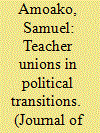| Srl | Item |
| 1 |
ID:
191417


|
|
|
|
|
| Summary/Abstract |
Ghana has a rising residential electricity consumption of 47% of total generation while at the same time experiencing a worsening household age-dependency ratio considered to be above the global average. Using the most recent Ghana Living Standards Survey (2016/17 i.e., the seventh round), and employing logistic regression analyses, this paper examines how and the extent to which household age-dependency (0–14 and 64+) and other sociodemographic characteristics of Ghanaian households influences residential electricity consumption. In the face of worsening climate change partly attributable to high energy consumption, understanding the role household structure in residential electricity consumption across gender and location is critical in designing appropriate demand-side management policies. The results show that dependency ratio increases electricity consumption by approximately 12.4%. Furthermore, female-headed households with dependents tend to use less; or have reduced electricity usage compared to a male-headed household with dependents. The study recommends among others, the use of local government to spearhead education on energy efficiency especially at the household level and the establishment of green financing scheme for importers, manufacturers, and households.
|
|
|
|
|
|
|
|
|
|
|
|
|
|
|
|
| 2 |
ID:
131243


|
|
|
|
|
| Publication |
2014.
|
| Summary/Abstract |
The negotiation to end apartheid - which was initiated in secret in the 1980s - solidified in the 1990s when FW de Klerk unbanned the African National Congress (ANC), South African Communist Party (SACP), Pan African Congress (PAC) and other political and social movements, as well as struggle icons, prominent among whom was Mandela. The South African Democratic Teachers' Union (SADTU) emerged within the euphoria surrounding Mandela's release and the negotiations to end apartheid. SADTU combined its educational struggles with the political struggle to end apartheid rule. Drawing on documentary (mainly archival), newspaper reports and oral evidence, this article examines SADTU's struggles for recognition, its resistance against education restructuring, and its defiance campaign against inspection from 1990-1993. I suggest that SADTU's contentions during the period were rooted in the political struggle to end apartheid rule since it regarded the apartheid education departments as illegitimate structures needing to be dismantled. In addition, the socio-economic undercurrents that characterized the transition were carried into education restructuring and thus pushed SADTU into militancy.
|
|
|
|
|
|
|
|
|
|
|
|
|
|
|
|